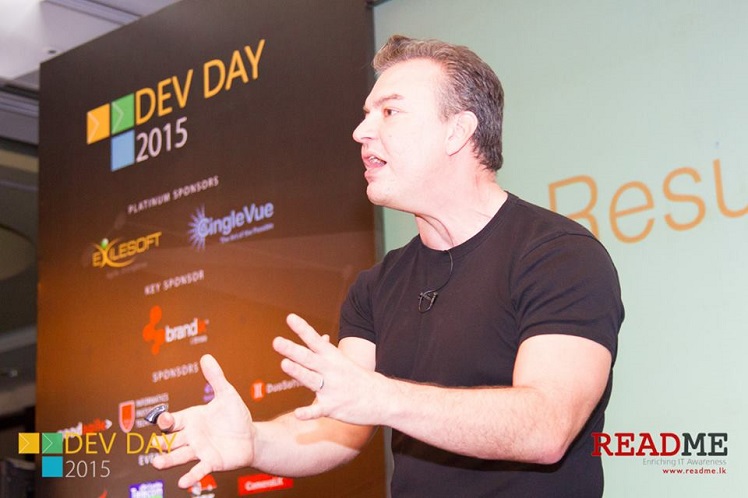“Raise your hand if you think it’s not only important to have a job but to have a job you like”
This was the opening line by Alexander Kjerulf at his closing keynote speech titled “Happiness at work” for the recently concluded DevDay 2015.
Alex, an avid reader, film buff, snowboarder and CrossFit fanatic completed his MSc in Computer Science back in 1994. In 1997, he, along with two of his friends collaborated to create Enterprise Solutions and provided large software solutions for major clients in Denmark. Their number one goal was not to make it large or successful, but rather to make it happy. He then proceeded to found WooHoo.inc in 2003. Their sole purpose? To make people happy. Be it via workshops, speeches, management training, the goal is to make employees feel happy at their workplace.

Alexander has also written 4 books regarding happiness at work, one of which has been translated into over 10 languages. He then showed a list of 35 countries where he has conducted a number of workshops.
“The problem is that many many people are unhappy at work”
How often do you have a bad day at work? An astonishing 1/3 people in Denmark have at least one bad day at work and a further 2/3 people in other countries have at least one bad day a week. It may even be worse in professions such as IT. This is a shame, Alex explains as IT workplaces should be really happy. They get to work with cool technologies and cool people. But sadly, this is not so.

Taken from http://woohooinc.com/tips/devday
“Anyone can be happy at work”.
His demo was a 25-second video clip about a female named Valerie who cleans bathrooms and she’s really happy at work. Everybody should be happy at work. It has a large influence about how we feel at work and also at home. Most people think it’s about the salary, the perks or promotions. What makes you happy at work?
“If you don’t know what makes you happy at work, you will chase all the wrong things and you will be forever miserable”
The feeling of pride when you do great at work is a key influence at having happiness at work. What really makes us happy is when we get meaningful results. He takes examples such as Nurses and teachers. There are many ways that you can praise people at work in order to increase happiness at work. Praise by face to face contact, sending emails, praise people at meetings, all these methods increase happiness at work. He then conducted an experiment for the audience to high-five each other. Praise and recognition while being really important, is also really rare. If you do something good at your workplace, often it goes unnoticed. However, do something wrong, and you will be reminded of it forever. This needs to change, Alex explained. If someone does a good job, then go ahead and tell them.
“You should never praise people, just to praise them. It has to be meaningful and genuine”
There are two main things that make us happy at work.
- Results
- Relationships
The fact that people see you and respect you is an incredibly important feeling for happiness at work. The most important relationship at work would be the one you have the people you see every day at work and with your boss.
Stress is becoming an increasing problem at the workplace. A Swedish study conducted found that if you have a high workload and low social support, you had a much higher mortality rate from diseases such as heart diseases and strokes.
Another physical exercise ensues with people saying a simple “Good Morning” to the people at work. This goes from level 1, where it’s a simple “good morning “ to a level five “good morning” which includes a high five or hug. This may not be to everyone’s liking so it helps to be aware of what other people are feeling.
Everybody is different, and some of them are result-oriented. Some value relationships over results. It’s really important to know yourself and also to know the people around you who you are working with. You should also identify what type of person you are. People in IT tend to be more result oriented when compared to people in other fields of work. What really makes me tick, Alex said was to make a difference with what I’m doing.
Does money matter? Yes, it does. Using a video as an example, Alexander explained how we want to be treated fairly and we also want to see others treated fairly. It’s embedded into us and it’s an important element if we are to be happy at work.
“Having a low salary will not make you happy, yet having a high salary will not make you happy either”
The number one thing we spend time one is sleep, followed by work, closely behind a television. You will spend more time at work than anything else in your life. At this point, it is important to pick a job you love. According to research, people who hate their jobs have a much higher risk of cancer, type 2 diabetes, and even heart diseases, it can even kill you in the end. Alex also touched on positive psychology. From there, three factors were found that make us happy in life.
- A good romantic relationship
- Friends
- A good and meaningful job

“Being happy at work makes you happier and healthier at life but it also makes you better at work”
Most people think that working really hard will, in turn, lead to success which in turn would lead to a happier life when in reality, it’s the other way around. When you find work you love, then you will do much better work and that, in turn, will make you much more likely to achieve success.
“Happy workplaces make more money”
It all starts with leadership. A good leader who can create good results and relationships, managers who can relate to people and themselves, these are the vital elements needed to make a happy workplace. But what happens if you are given a bad leader or manager, well, then you just have to quit, Alex went on to explain. If you cannot explain things to your boss and they won’t change, then that may be the only choice you have.
“Working for a bad manager is the number one cause for stress at work”
Using an example of 4 nurses whose first job was at a children’s hospital, Alexander went on to explain how these 4 nurses upon learning that their first job at a hospital was bad, went on to take a day off and brainstormed on how to make the workplace a much happier place.

Taken from http://woohooinc.com/happiness-at-work/tips/devday/
This included a small plush elephant that would be given to one person who made a difference and thereby brought happiness to the workplace. It took them four months, but they could feel the difference but the largest impact was felt by the patients and their parents who saw that the nurses were cheerful, happy and that reflected in the workplace.

Taken from http://woohooinc.com/happiness-at-work/tips/devday
The moral of the story? Everyone can make a difference, in fact, you can and have made a difference in the things you say and do and how you treat your coworkers.
Leaving a cup of coffee or just leaving a note for someone you think is hardworking can really boost that person’s morale and encourage them to work even better. Training to focus on the positive things at your workplace can increase your happiness at work and in your life as a whole.
“Permanent overwork means you get less work done”
If you’re given a lot of work, you may perform your tasks with insane amounts of vigor at first, but over time, you will bog down to a certain level and then dip below that as well. This is permanent overwork and is bad for your work life. You have less time for your friends and family, and also means that you have less time for work.
“Celebrate the things that go well at work”
Celebrating our successes is very important. It helps build up results and relationships.
In conclusion, Alexander left us with three important points,
- Happiness at work is really important.
- The two main things that make us happy at work – Results and Relationships
- Happiness at work is something we do. You don’t get it automatically. You have to achieve it consciously.






GIPHY App Key not set. Please check settings